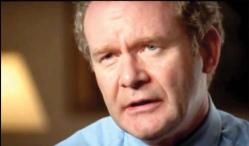March 30, 2017
 Martin McGuinness, Photo courtesy Robert P. Connolly
Martin McGuinness, Photo courtesy Robert P. Connolly
In some respects, it was as if he were just another government official showing up for work on a chilly Belfast morning. But as the man who had inspired cheers and chills for three decades emerged from his car, it was surprising that television crews and throngs of reporters weren’t there to capture the moment.
The date was Dec. 2, 1999, and there wasn’t a camera in sight when Martin McGuinness began to climb the stairs at Stormont Castle in Belfast.
The date has taken its place in the annals of Irish history, as it marked the first gathering of the ministers who would run Northern Ireland’s newly elected government – a power-sharing coalition flowing out of the Good Friday peace agreement. For McGuinness, this was the beginning of a nearly two-decade tenure as a top official in the government of a state that for many years he had been determined to destroy.
And on this first morning, the oddity, the sheer surreality of the former Irish Republican Army chief of staff morphing into something resembling a conventional politician was not lost on anyone – the Derry republican included.
A handful of civil servants – for the first time seeing Martin McGuinness not as the feared leader of the IRA nor as deputy leader of its allied Sinn Fein political party, but now as education minister in their brand-new government – impishly called out, “Good morning, minister,” sensing that the title would be worn like an ill-fitting suit.
McGuinness, surveying the staffers along with a Boston reporter who happened to be there filming interviews for a documentary film, grinned broadly and said: “The next one of ye who calls me ‘minister’ gets sacked” – punctuating his quip with a broad wink.
In many ways, the moment – which led to handshakes and more laughs with the staffers, who very likely had lost friends and relatives to the IRA during Northern Ireland’s brutal Troubles – was classic McGuinness.
He was a man who never backed away from his involvement with the IRA.
In The Road to Reconciliation, the Northern Ireland documentary film that I was able to make with director Paul Canney, McGuinness, who died last month at age 66, was unflinching when asked about his connection with the IRA and the violent campaign it waged to oust the British and unify Ireland.
“I’ve never denied down the years being involved in resistance … in fact, I’m proud to say I was,” McGuinness noted in the film. “We were effectively in a state of war with … the forces of the state and indeed the British government, and it seemed to me that what was happening within our society … was just the same as what happens in South Africa or the Middle East, where people are oppressed, where violence is used by the state, and where there is massive inequality and injustice. And it just seems the most natural thing in the world is to fight back.”
Despite his role as one of the key architects of that fight, the McGuinness who climbed the stairs of the Stormont Castle that morning and joked easily with the sophisticated, university-educated government staffers – who were to become aides to the working-class republicans taking their places in government – was able to use his easy touch to build bonds with the Protestant unionists who once feared and reviled him.
Bonds strong enough that the Rev. Kyle Paisley, the son of the late unionist stalwart Ian Paisley, noted his sadness at the passing of McGuinness. In the most unlikely of developments, McGuinness served easily and effectively with the elder Paisley when election results brought them together as deputy first minister and first minister of Northern Ireland, respectively.
“Look back with pleasure on the remarkable year he and my father spent in office together and the great good they did together. Will never forget his ongoing care for my father in his ill health,” Kyle Paisley tweeted when McGuinness died.
A less harmonious governmental partnership is the one that McGuinness shared with current First Minister Arlene Foster, who now leads the Democratic Unionist Party that Ian Paisley founded during the darkest days of the Troubles.
But if that relationship was strained, consider that Foster was eight years old when the IRA shot her father, a police officer, at the family’s home, and as a teenager, she was a passenger on a school bus bombed by the group.
It was unclear if Foster, who had clashed with McGuinness in his final days in government, would attend the former IRA leader’s funeral, but when she walked into St. Columba’s church in Derry, mourners burst into loud and sustained applause – another bridge built, perhaps the final step taken in Martin McGuinness’s long journey of reconciliation.
Robert P. Connolly, a former Boston Irish Reporter columnist and Boston Herald reporter, works for the University of Massachusetts

